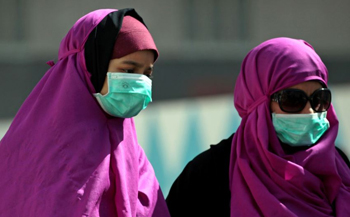Riyadh, Aug 24: The Ministry of Health announced Saturday mandatory measures for Haj and Umrah pilgrims coming from countries with high rates of infectious diseases.
 The ministry had already sent out a circular to the Foreign Ministry, which distributed among embassies the notice spelling out health requirements prior to issuing pilgrim visas.
The ministry had already sent out a circular to the Foreign Ministry, which distributed among embassies the notice spelling out health requirements prior to issuing pilgrim visas.
Sami Badawood, Jeddah Health Affairs director, told Arab News on Friday that the Kingdom has been carefully monitoring developments that are taking place around the globe in the field of infectious diseases.
“The requirements stipulated in the circular are in line with World Health Organization (WHO) guidelines on controlling the spread of infection,” he said.
The Kingdom’s focus this year is on the Ebola virus, which has registered the worst outbreak ever.
Ebola is centered in Liberia, Sierra Leone, Nigeria and Guinea but has spread to other countries in recent months.
According to the latest WHO report, 221 laboratory-confirmed and suspected Ebola cases surfaced between Aug. 17 and 18 and a total 106 deaths were reported from these four main endemic countries during the same period.
“Although we do not issue Haj visas for pilgrims coming from endemic countries, we will still be monitoring pilgrims coming from other African countries for Ebola symptoms,” said Badawood.
He said the ministry would also focus on diseases such as yellow fever, meningitis, seasonal influenza, polio and food poisoning.
He added that vaccination should be administered to pilgrims 10 days before the dates of their departure for Makkah and Madinah.
“We have prescribed certain vaccines depending on the country,” he said.
“Ships and aircraft with pilgrims on board should also produce a certificate that carriers are free of mosquitoes.”
Yellow fever-endemic countries are Angola, Benin, Sudan, Senegal, Burkina Faso, Central African Republic (CAR), Cameroon, Burundi, Chad, Uganda, Congo, Côte d’Ivoire, Sierra Leone, Somalia, Ethiopia, Democratic Republic of Congo, Gabon, Gambia, Ghana, Guinea, Equatorial Guinea, Guinea-Bissau, Togo, Kenya, Liberia, Sao Tomé and Principe, Mauritania, Niger, Nigeria, Rwanda, Tanzania, Mali, Ecuador, French Guiana, Guyana, Brazil, Bolivia, Suriname, Peru, Panama, Trinidad and Tobago, Venezuela, Colombia, Argentina and Paraguay.
He said that vaccination against meningitis is mandatory for local as well as foreign pilgrims.
The vaccination should be given 10 days before departure and is valid only for a period of three years.
Badawood pointed out that meningitis may spread during Haj, causing outbreaks, especially among pilgrims coming from endemic areas. He added that congestion and overcrowding exacerbates transmission of diseases.
The meningitis vaccine is given to adults and children over the age of two and it is not administered to pregnant women.
Vaccination for polio is also compulsory for all pilgrims coming from African countries, Pakistan, India, Nepal and Afghanistan.
An oral dose of polio is also compulsory for people coming from Uganda, Kenya, Benin, Angola, Togo, Niger, Burkina Faso, Mali, CAR, Chad, Côte d’Ivoire, Ghana, Democratic Republic of the Congo and Ethiopia.
Upon arrival, pilgrims from these countries will be given another oral dose of polio vaccine irrespective of their age.
Besides these vaccinations, the spokesman advised pilgrims to take precautions against influenza to prevent flu during their stay in the Kingdom.
The flu vaccine is not mandatory but is strongly advised considering present weather conditions and the susceptibility of pilgrims to influenza.
High-risk patients who have chronic ailments, such as diabetes, hypertension and renal diseases, have been advised to take the flu vaccine, which will help them to perform Haj and Umrah rituals more efficiently.





Comments
Add new comment